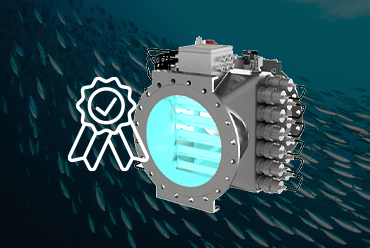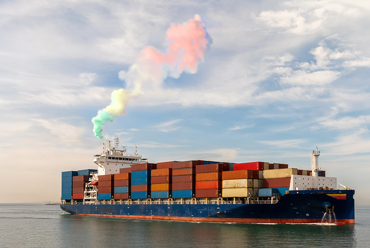
November 2025
May 2014
One component, in particular, needs to be carefully selected to ensure safe and efficient sulphur removal. The Pump!
The time is now
Shipowners are having to move fast to change fuel type to distillate fuel or LNG, or to install the exhaust gas cleaning systems (EGC systems) known as scrubbers. They’re reacting to new sulphur emission legislation set to come into force in designated sea areas generally known as Emission Control Areas (ECAs) on 1 January 2015. And later, in 2020 or 2025 (pending an IMO decision), a global 0.5 percent cap on such emissions may be introduced.
Scrubbers, it seems, are likely to pay back on their upfront investments within two to three years. So, while the capital costs are still an important issue for shipowners, more and more focus is being directed toward a crucial difference between exhaust gas scrubbing and other onboard systems. Namely, that it’s a chemical process. And that’s a difference that demands far more of one particular component used in a variety of ordinary marine contexts: the humble pump. In fact, a growing number of industry voices are predicting surprises in store for those who think that, well, a pump’s just a pump, isn’t it?
Mind shift
Scrubber systems are chemical processes implemented in engine rooms to clean out excess gas, reducing sulphur content in emissions. With recent industry estimates putting the number of vessels that will be fitted with this machinery at around 15,000 by 2020, marine pump manufacturers all around the world are scrambling to have their equipment included in the scrubber solutions specified by shipyards and turnkey suppliers.
One of the experts concerned about marine pump manufacturers planning to adapt their products for use in scrubbers is Ove Mårtensson, managing director of leading pump manufacturer DESMI’s Norwegian subsidiary. In his estimation, most people don’t realize how new and different it is to have a chemical process running on board.
“This is something entirely new for the vast majority of shipowners,” he says. “Removing sulphur from exhaust gas is a chemical process that demands a lot more than just installing the usual type of pump and forgetting all about it. It takes knowhow, experience and the right component quality to design scrubber pumps that will go the distance.”
The scrubber pump’s key task – to move liquid from one place to another – is the same as for other pumps on board a vessel. But removing sulphur from exhaust gas involves high temperatures and varying PH levels. Faced with such properties, an ordinary seawater or freshwater pump wouldn’t make it to the first scheduled servicing date. Instead, its surfaces are likely to be eaten away in a matter of weeks.
“For many marine pump manufacturers, making the transition to supply pumps for a chemical processing system in a marine environment will present significant difficulties and steep learning curves,” says Ove Mårtensson. “And shipowners should be careful not to join their suppliers on the learning journey.”
DESMI’s scrubber pump range uses “super duplex” steel – a duplex stainless steel with a Pitting Resistance Equivalent Number (PREN) greater than 40. Super duplex grades typically contain 25 percent or more chromium, which makes them highly resistant to harsh chemical treatment. Given the high temperatures, high pressure (7-8 bars) and acidity of scrubbing, using a cheaper, less capable material could have major consequences. At worst, shipowners could be faced with a leaking system that endangers the health of engine room crew.
Why does DESMI think its scrubber pump solutions may be able to handle the demands of scrubbing better than most? It turns out that the company knows a lot about chemical processes both as a marine supplier and as a long-term supplier to process industries. During the past thirty years, for example, DESMI has developed and supplied pump solutions for chemical, petrochemical and other land-based process industries.
“Marine pump suppliers that haven’t built up sufficient experience in other chemical-processing applications have a lot of catching up to do,” says Ove Mårtensson. “We’re talking about pumps produced using exotic materials and operating with aggressive liquids. While for processing system suppliers it’s all proven technology, there are a lot more factors to consider and calculate than with ordinary marine pumps. And, because of the overall impact on ship operation, arriving at the right solution requires a close partnership between the pump manufacturer and the turnkey process supplier.”
Focus on energy efficiency
In the scrubbing game, it’s not all about durability, safety or compliancy. There’s another, just as vital purchasing parameter: pump efficiency – which is directly linked to the vessel’s fuel consumption. Basically, the idea is to use as little power as possible for the scrubbing process, because every kilowatt of power used contributes to greater consumption. Depending on the size of vessel, a scrubber may use between 600 and 1500 kilowatts of power per hour. So specifying a high-performance pump that can reduce energy consumption by as much as ten percent is well worth the small extra investment.
Due to the integration of the scrubber in the funnel, the scrubber pump is often operated at a relatively high pressure, and, on top of that, with a large capacity. Undaunted by these challenges, and unwilling to compromise on energy consumption, DESMI’s new scrubber pumps have been engineered to match the operating points, delivering pump efficiencies as high as 85 percent!
First-mover advantage
DESMI’s scrubber-class products are already finding favour in the industry among leading global turnkey EGCS suppliers, with the first pumps proving their worth in cruise line trials as early as 2012. Such companies are the suppliers of choice for scrubber systems that incorporate all the elements of a successful solution. Their products typically incorporate years of experience in the processing industry and deep knowhow about, for example, operational aspects. DESMI’s products figure widely in these solutions, optimizing efficiency and minimising risk and maintenance costs both for shipowners and the turnkey suppliers that serve them.
“Shipowners are contacting turnkey suppliers and asking for systems that are highly energy-efficient,” says Ove Mårtensson. “So when we’re working with these suppliers, we are continually challenged to achieve the highest efficiency – and our ability to do this is one of the reasons we are most often selected for turnkey solutions.”
No surprises
DESMI’s scrubber pumps have other advantages, too. The Super Duplex series is based on the same design platform as the rest of the company’s DESMI NSL pumps, ensuring the same mechanical performance and compact space requirements as this well-reputed family of products, and living up to the same mechanical warranties. Maintenance is every bit as easy as with the NSL pumps, too.
DESMI’s turnkey supplier customers, therefore, don’t need to incorporate many changes into their designs, or invest in extensive retooling and training. As an added benefit, the new series of pumps is lighter, thanks to the use of premium materials.
“Our customers know the NSL flagship series well, so for scrubber systems we have taken our best marine pumps and upgraded them to become chemical process pumps,” says Ove Mårtensson. “This is key to being able to deliver the same warranties and other benefits our customers are used to.”
Green ship strategy
DESMI was one of the first companies to work with Denmark’s Green Ship of the Future initiative, whose vision is to reduce emissions by developing environmentally friendly and energy-efficient technologies. The company’s move into scrubber pumps is, therefore, a natural step in an overall strategy that also includes, for example, ballast water treatment systems (BTWS) and Energy Saving Systems (ESS) such as DESMI OptiSave. It is also a contributor to regulatory discussions around energy and environmental topic areas.
Underlying DESMI’s scrubber pump offering is a concept the company calls “One Global Service & Logistics”, comprising a global service team and worldwide infrastructure covering everything from on-site or online/phone support to customised service programmes.
“With thousands of DESMI pumps at work on the seven seas, we are always able to access our global parts database, sending spare parts or complete pumps 24/7/365,” says Ove Mårtensson.
With its strategic focus, worldwide service organisation, and the knowhow and technologies built by the company over the years, shipowners can rest assured that turnkey scrubber solutions incorporating DESMI pumps put their vessels, crews and operational efficiency in safe hands.

November 2025

October 2025

October 2025

September 2025